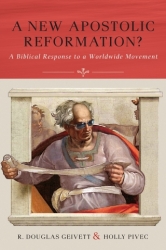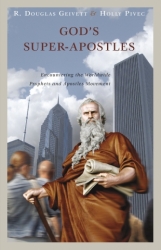Today we continue our interview with Doug Geivett and Holly Pivec regarding their important work on the “New Apostolic Reformation.” If you missed Part 1, you can catch up here.
Fred Zaspel:
Let’s talk more about what they believe. Describe what you call “the biggest innovation” of the New Apostolic Reformation.
Doug Geivett:
The biggest innovation of NAR is the belief that apostles, working together with prophets, must take over governance of the church — taking the reins from the pastors, elders, and denominational leaders — so that God’s end-time plans can be fulfilled and Christ can return. In other words, pastors and elders must submit to apostles, who call the shots and lead the church in waging a special kind of NAR spiritual warfare.
Fred Zaspel:
So what happens if a church won’t submit to the authority of NAR apostles and prophets?
Holly Pivec:
At the very least, that church will be ineffective and won’t take part in God’s end-time plans for the church and the earth. At the worst, that church will be seen as opposing God. Some leaders in the NAR teach that anyone who speaks critically about their teachings is under the influence of a powerful demonic spirit, known as the “spirit of religion.” In the NAR, critics are often vilified in this way.
Fred Zaspel:
With all its emphasis on spiritual warfare and miraculous gifts and such, does the NAR have any connections to mainline Pentecostalism?
Doug Geivett:
Unfortunately, some have confused this movement with classical Pentecostalism, and even the charismatic movement. But there are significant differences. One reason for the confusion is that the NAR emerged out of independent charismatic churches and thus has gained a foothold in many of those churches in varying degrees. Another reason for the confusion is that Pentecostals and charismatics — like those in the NAR — emphasize the miraculous gifts, such as prophesying and speaking in tongues. But, unlike the NAR, Pentecostals and charismatics don’t typically believe in the present-day governing offices of apostle and prophet. This is a crucial difference that sets apart these other groups from the NAR.
Holly Pivec:
Leaders of the Assemblies of God, the world’s largest Pentecostal denomination, have recognized this difference and are concerned about NAR influence among some of their pastors. Our books have received endorsements from some of them.
Fred Zaspel:
Does the question of continuationism-cessationism have a part in your critique?
Doug Geivett:
We don’t argue for cessationism, the view that the miraculous gifts listed in 1 Corinthians 12 are no longer active in the church. Nor do we argue for continuationism. Whether or not the miraculous gifts are ongoing has no bearing on our critique.
Fred Zaspel:
Does this movement have any historical precedent? Have others gone down this road before? And if so, is the NAR linked to them in some ways, or do they simply share theological or other commonalities?
Holly Pivec:
In the past, fringe groups attempted to restore the offices of apostle and prophet, including the Irvingites of the 1830s and the Apostolic Church of the early 1900s. Apostles and prophets also surfaced in the African Independent Churches movement, which began around 1900. But the most noteworthy attempt to restore apostles and prophets in North America, prior to NAR, was the post-World War II Latter Rain movement, also called the New Order of the Latter Rain. The Latter Rain movement sprang out of a revival that broke out at a Pentecostal Bible school in 1948 in North Battleford, Saskatchewan, Canada. This revival quickly spread to the United States and elsewhere around the world. Leaders in the movement taught the “manifested sons of God” doctrine, which held that people who received the new apostolic and prophetic revelations could attain a degree of immortality in this life, which would then empower them to usher in God’s kingdom. Many leaders in the contemporary NAR movement, including C. Peter Wagner, identify the Latter Rain movement as the NAR’s theological predecessor and honor Latter Rain leaders as pioneers of NAR teaching. And the “manifested sons of God” doctrine continues to be promoted by some influential NAR leaders, such as the prophet Bill Hamon.
Fred Zaspel:
You’ve written and published two books on this subject at the same time. How do the two books differ?
Holly Pivec:
One is for beginners and the other is more in depth. God’s Super-Apostles is a beginner’s introduction to NAR. It’s concise and includes true stories of people’s personal experiences with the NAR. It has appendices containing practical advice for people whose children, or other family members, have embraced NAR beliefs. They offer advice to pastors who wish to use their platforms to warn people about the NAR. And they include questions to ask of churches to learn if they’re part of the NAR.
Doug Geivett:
Our second book is called A New Apostolic Reformation? with the subtitle A Biblical Response to a Worldwide Movement. In this book we go into much greater depth in evaluating NAR teachings. It’s heavily documented to aid readers who wish to conduct their own research.
Fred Zaspel:
These books have been out now for several months – have you been encouraged with their reception? What’s the response been like?
Holly Pivec:
The response has been very positive. We’ve done several radio interviews and podcasts that have put the NAR on the radar of more people. The books have received favorable and high-profile reviews, including one by blogger and author Tim Challies. Our shorter book, God’s Super-Apostles, was featured in World Magazine as one of four “notable” books on Christianity.
Doug Geivett:
What means the most to us are the letters and e-mails we receive almost daily. Many of the people write telling us about friends and family involved with the NAR. They tell us they were able to discuss our books with their loved ones. We’ve heard from others who did not know what to make of the new teachings and practices entering their churches until they read our books and recognized the signs of NAR influence. Now they’re making efforts to challenge those teachings in their churches. So we’re very encouraged.

